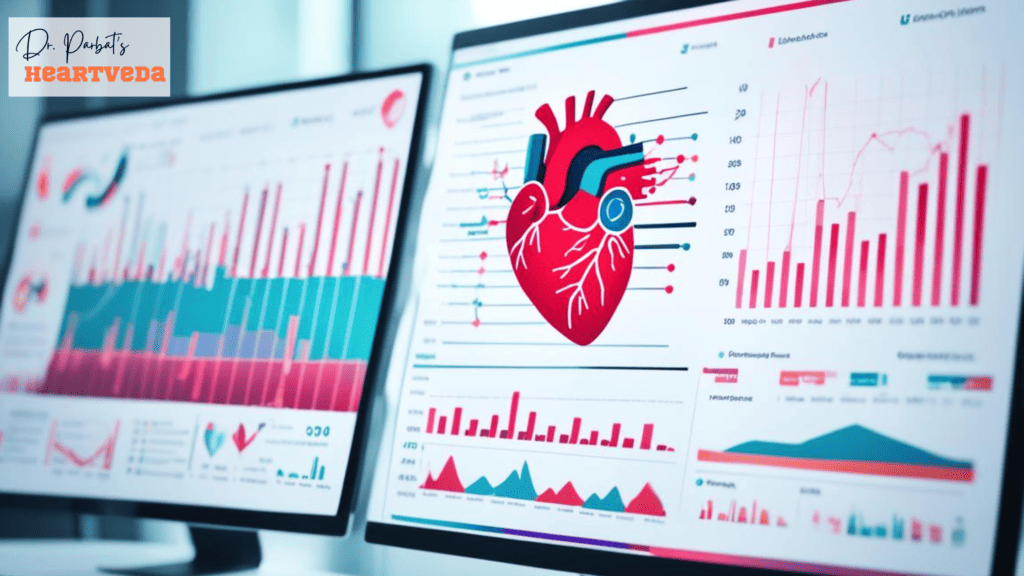
Electronic medical records (EMRs) are revolutionizing the way medical professionals manage cardiovascular care. These digital medical records provide a comprehensive view of a patient’s medical history, lab results, medication lists, and treatment plans, allowing medical professionals to make informed decisions and optimize care delivery.
With EMRs, healthcare providers can store and access patient data electronically, leading to more efficient and effective patient care. EMR systems streamline workflows, enhance communication among healthcare teams, and facilitate the coordination of care for patients with cardiovascular diseases.
Benefits of Electronic Medical Records for Cardiovascular Disease Management
The utilization of electronic health records (EHRs) in cardiovascular disease management offers numerous benefits. EHRs provide medical professionals like you with easy access to comprehensive healthcare data, allowing for more accurate diagnosis and personalized treatment plans for your patients. By leveraging EHRs, you can track your patients’ progress over time, monitor their medication adherence, and identify potential risk factors associated with cardiovascular diseases.
One of the key advantages of EHRs is the seamless exchange of information among healthcare providers. This ensures that there are smooth transitions of care, reducing the likelihood of medical errors and improving patient outcomes. Additionally, EHRs facilitate enhanced care coordination by enabling effective communication between different healthcare teams involved in a patient’s cardiovascular care.
EHRs also promote patient engagement in their own healthcare management. With electronic health records, your patients can actively participate in their treatment process by accessing their medical information, understanding their diagnosis and treatment plans, and making informed decisions regarding their cardiovascular health.
Furthermore, EHRs support advanced clinical decision support systems, which can provide you with real-time insights and recommendations based on evidence-based guidelines and patient-specific data. This assists you in delivering quality care, improving patient outcomes, and optimizing healthcare resource utilization.
Overall, by embracing the utilization of electronic health records, you can streamline cardiovascular disease management, make data-driven decisions, enhance care coordination, and empower your patients to actively participate in their own well-being.
Implementing EMRs in Cardiovascular Care
The implementation of Electronic Medical Records (EMRs) in cardiovascular care marks a significant shift from traditional paper-based medical records to digital systems. This transition requires healthcare organizations to invest in compatible EMR systems, train medical professionals on using the new technology, and prioritize the security and confidentiality of patient data.
By adopting EMRs, medical professionals gain the ability to efficiently document patient encounters, access relevant clinical guidelines, and track the effectiveness of treatment plans. These digital medical records enable healthcare providers to have a comprehensive view of the patients’ medical history, lab results, medication lists, and treatment plans, leading to more informed decision-making and optimized care delivery.
Furthermore, EMRs facilitate seamless data sharing and interoperability between different healthcare settings, ensuring coordinated care delivery and improved patient outcomes. With digital records, medical professionals can securely exchange patient information, collaborate with specialists, and streamline care transitions for patients with cardiovascular diseases.
| Benefits of Implementing EMRs in Cardiovascular Care |
|---|
| Efficient documentation of patient encounters |
| Access to relevant clinical guidelines |
| Tracking the effectiveness of treatment plans |
| Improved care coordination and communication |
| Enhanced data sharing and interoperability |
Implementing EMRs in cardiovascular care offers a transformative opportunity for healthcare providers to enhance patient care, increase efficiency, and improve overall healthcare data management. By leveraging the full potential of digital medical records, medical professionals can optimize cardiovascular care delivery and ultimately improve patient outcomes.
Maximizing the Potential of EMRs in Cardiovascular Care
To maximize the potential of digital medical records (EMRs) in cardiovascular care, you need to optimize their utilization. Accurately documenting patient information, recording relevant clinical data, and consistently updating patient records are essential steps in making the most of EMRs. By doing so, you can harness the power of EMRs for data analysis, clinical decision support, and population health management.
- Identify trends: Through the analysis of digital medical records, you can identify patterns and trends in cardiovascular care. This data-driven approach allows you to make informed decisions and tailor treatment plans based on evidence.
- Track patient outcomes: EMRs provide a comprehensive view of patient data, enabling you to monitor progress, track outcomes, and assess the effectiveness of interventions. By leveraging EMRs, you can make data-informed adjustments to improve patient outcomes.
- Develop evidence-based treatment plans: With access to a wealth of healthcare data, you can create evidence-based treatment plans that are tailored to each patient’s unique needs. EMRs empower you to incorporate the latest research and guidelines into your practice.
In addition to optimizing EMR utilization, integrating patient-generated health data and remote monitoring technologies can further enhance cardiovascular care. Early detection of cardiovascular risk factors and improved patient engagement and self-management can be achieved through the seamless integration of these technologies with EMRs.
| Benefits of Maximizing EMR Utilization in Cardiovascular Care | |
|---|---|
| Identification of trends and patterns | Improved patient outcomes |
| Enhanced evidence-based treatment plans | Early detection of cardiovascular risk factors |
| Data-driven decision making | Increased patient engagement and self-management |

Conclusion
In conclusion, the widespread adoption of electronic medical records (EMRs) has revolutionized cardiovascular care in India. Through the use of EMR systems, healthcare providers have been able to optimize the delivery of cardiovascular care and improve patient outcomes.
EMRs enable medical professionals to access comprehensive patient information at their fingertips, ensuring that they have a holistic view of a patient’s medical history, lab results, medication lists, and treatment plans. This accessibility allows for more informed decision-making and personalized treatment approaches.
Furthermore, EMRs streamline workflows and enhance care coordination among healthcare teams. The ease of sharing and exchanging information within EMR systems improves communication and collaboration, leading to more efficient and effective care delivery for patients with cardiovascular diseases.
As EMR systems continue to evolve and advance, the integration of advanced technologies and the adoption of interoperability standards will further enhance their effectiveness in cardiovascular care. The seamless integration of EMRs with other healthcare technologies holds great promise for empowering medical professionals to deliver evidence-based, patient-centered care that improves the overall cardiovascular health of the population.
Key Takeaways:
- EMRs enable medical professionals to store and access patient data electronically.
- EMRs provide a comprehensive view of a patient’s medical history, lab results, medication lists, and treatment plans.
- EMRs streamline workflows and enhance communication among healthcare teams.
- EMRs facilitate coordination of care for patients with cardiovascular diseases.
- EMRs optimize care delivery and improve patient outcomes in cardiovascular care.
